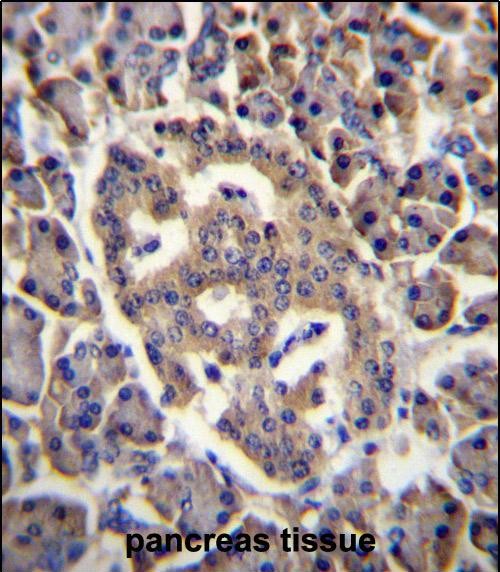

| WB | 咨询技术 | Human,Mouse,Rat |
| IF | 咨询技术 | Human,Mouse,Rat |
| IHC | 1/200 - 1/1000 | Human,Mouse,Rat |
| ICC | 技术咨询 | Human,Mouse,Rat |
| FCM | 咨询技术 | Human,Mouse,Rat |
| Elisa | 1/10000 | Human,Mouse,Rat |
| Aliases | Protein spinster homolog 3, SPNS3 |
| Entrez GeneID | 201305 |
| WB Predicted band size | 54.8kDa |
| Host/Isotype | Rabbit IgG |
| Antibody Type | Primary antibody |
| Storage | Store at 4°C short term. Aliquot and store at -20°C long term. Avoid freeze/thaw cycles. |
| Species Reactivity | Human |
| Immunogen | This SPNS3 antibody is generated from rabbits immunized with a KLH conjugated synthetic peptide between 470-498 amino acids from the C-terminal region of human SPNS3. |
| Formulation | Purified antibody in PBS with 0.05% sodium azide. |
+ +
以下是关于KRT19抗体的3篇参考文献及简要摘要:
---
1. **文献名称**:*"Cytokeratin 19 as a biomarker for circulating tumor cells in patients with breast cancer"*
**作者**:Rack B, et al.
**摘要**:该研究探讨了KRT19抗体在检测乳腺癌患者外周血循环肿瘤细胞(CTC)中的应用。通过免疫磁珠富集结合免疫荧光技术,发现KRT19阳性CTC与患者预后不良显著相关,提示其作为乳腺癌复发监测的潜在生物标志物。
---
2. **文献名称**:*"Utility of cytokeratin 19 immunohistochemistry in the diagnosis of hepatocellular carcinoma"*
**作者**:Govaere O, et al.
**摘要**:研究评估了KRT19抗体在肝细胞癌(HCC)诊断中的价值。结果显示,KRT19在部分HCC亚型中异常表达,与肿瘤侵袭性和不良预后相关,提示其抗体在鉴别诊断和分子分型中的临床意义。
---
3. **文献名称**:*"Keratin 19 antibody labeling improves detection of lymph node metastases in non-small cell lung cancer"*
**作者**:Matsumoto M, et al.
**摘要**:该研究利用KRT19抗体对非小细胞肺癌(NSCLC)患者的淋巴结样本进行免疫组化染色,发现与传统HE染色相比,KRT19抗体显著提高了微转移灶的检出率,有助于更精准的病理分期。
---
这些文献涵盖了KRT19抗体在肿瘤诊断、预后评估及实验技术中的关键应用,均为相关领域的代表性研究。
Keratin 19 (KRT19), a type I intermediate filament protein, is a key structural component of epithelial cell cytoskeletons. As the smallest acidic keratin (40 kDa), it pairs with keratin 8 (KRT8) to form filaments in simple and glandular epithelia. KRT19 is widely expressed in various tissues, including the gastrointestinal tract, pancreas, liver, and mammary glands, making it a valuable epithelial marker in pathological studies.
KRT19 antibodies are essential tools in diagnostic immunohistochemistry (IHC), particularly for detecting metastatic carcinomas of epithelial origin. They help distinguish adenocarcinomas from other malignancies and identify occult micrometastases in lymph nodes. In clinical oncology, KRT19 is routinely used as a circulating tumor cell (CTC) biomarker in liquid biopsies for cancers like breast and colorectal carcinoma. However, its expression varies across tumor types—strong in hepatocellular carcinoma (HCC) but absent in hepatocytes, aiding HCC differentiation from liver metastases.
Notably, KRT19 antibodies require careful interpretation due to cross-reactivity risks with other keratins and variable expression in non-epithelial cells during pathological states. Despite limitations, they remain critical for tumor subtyping, prognosis assessment, and monitoring minimal residual disease. Recent research also explores KRT19's role in cancer stem cells and therapy resistance mechanisms.
×